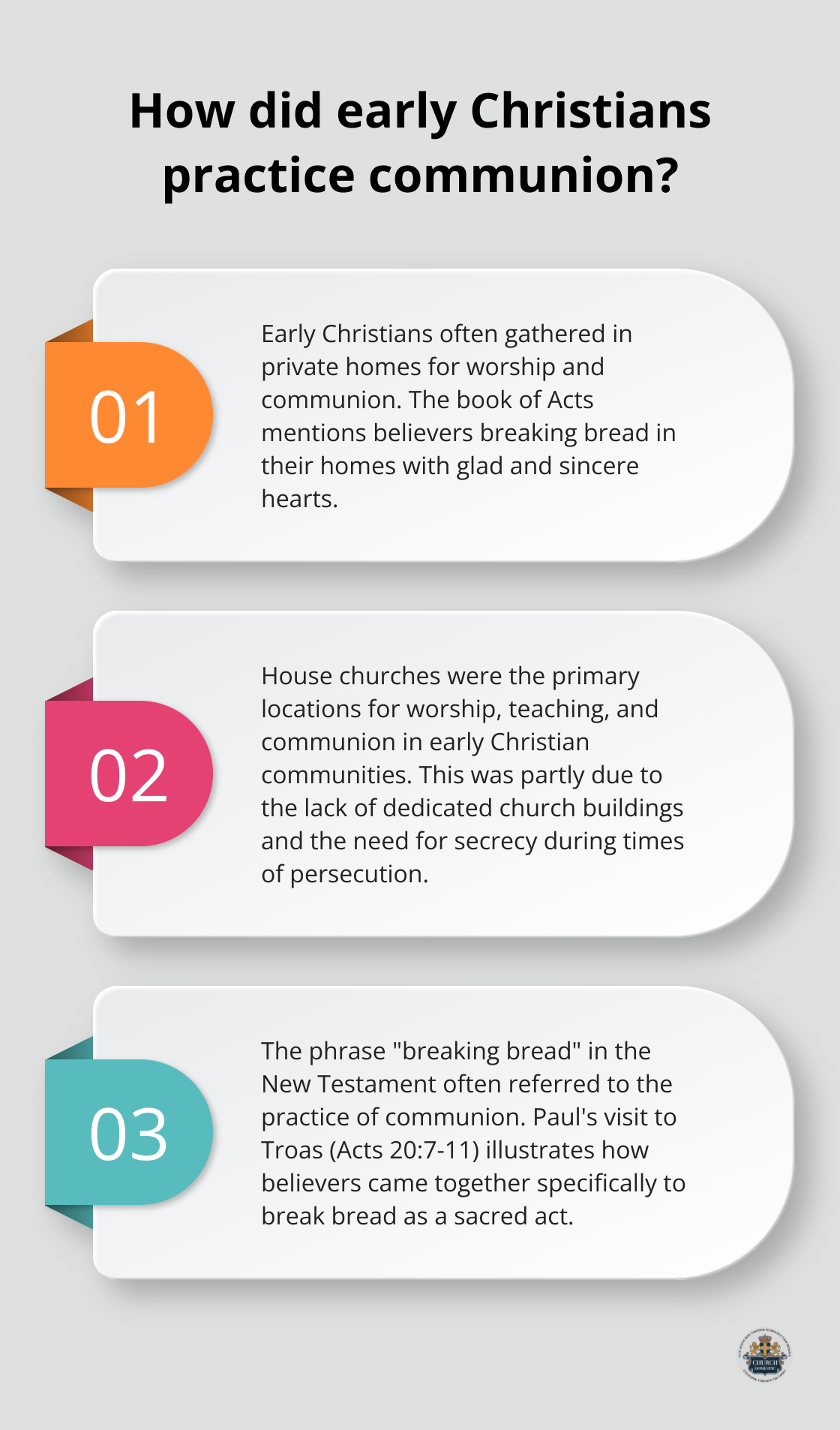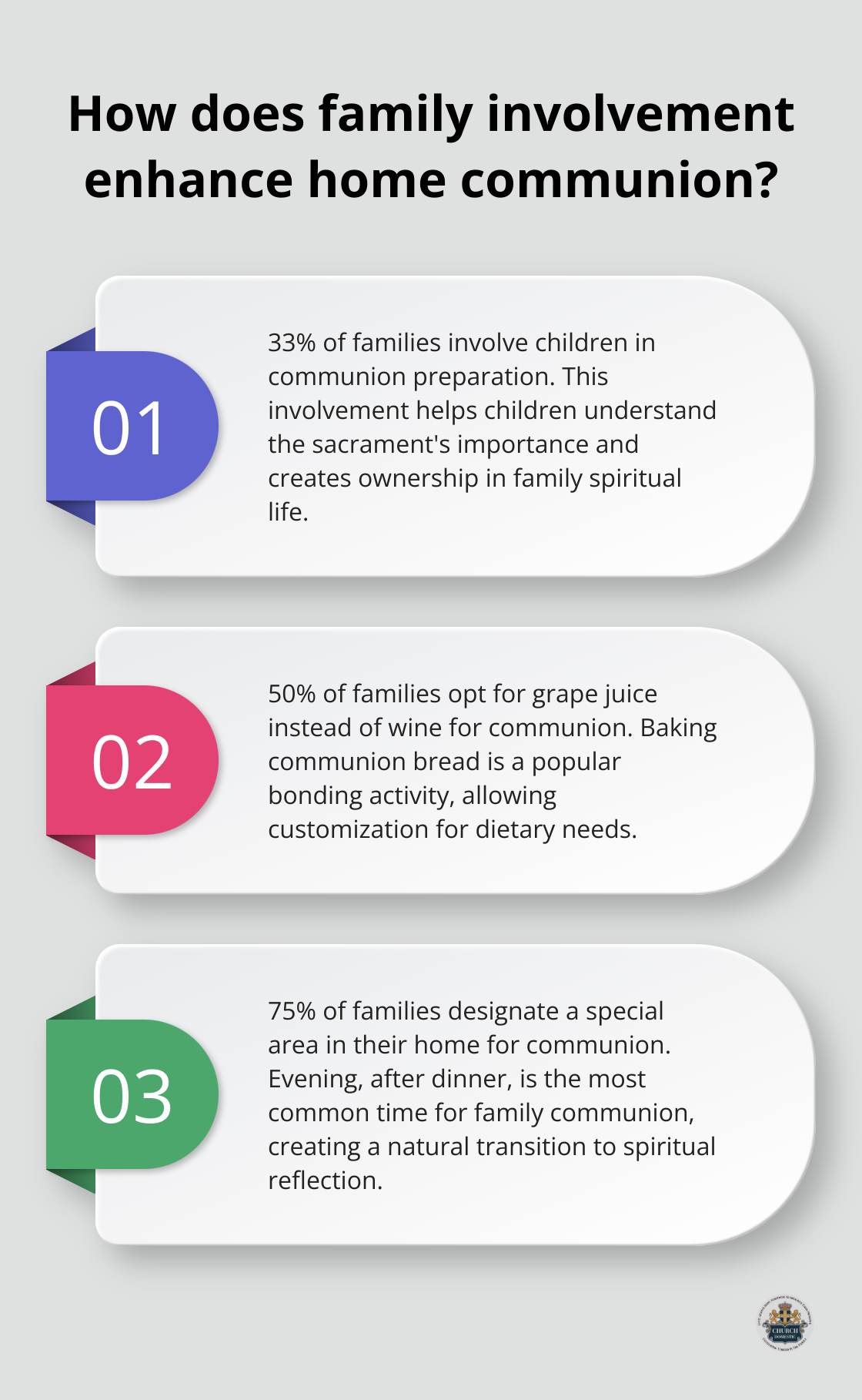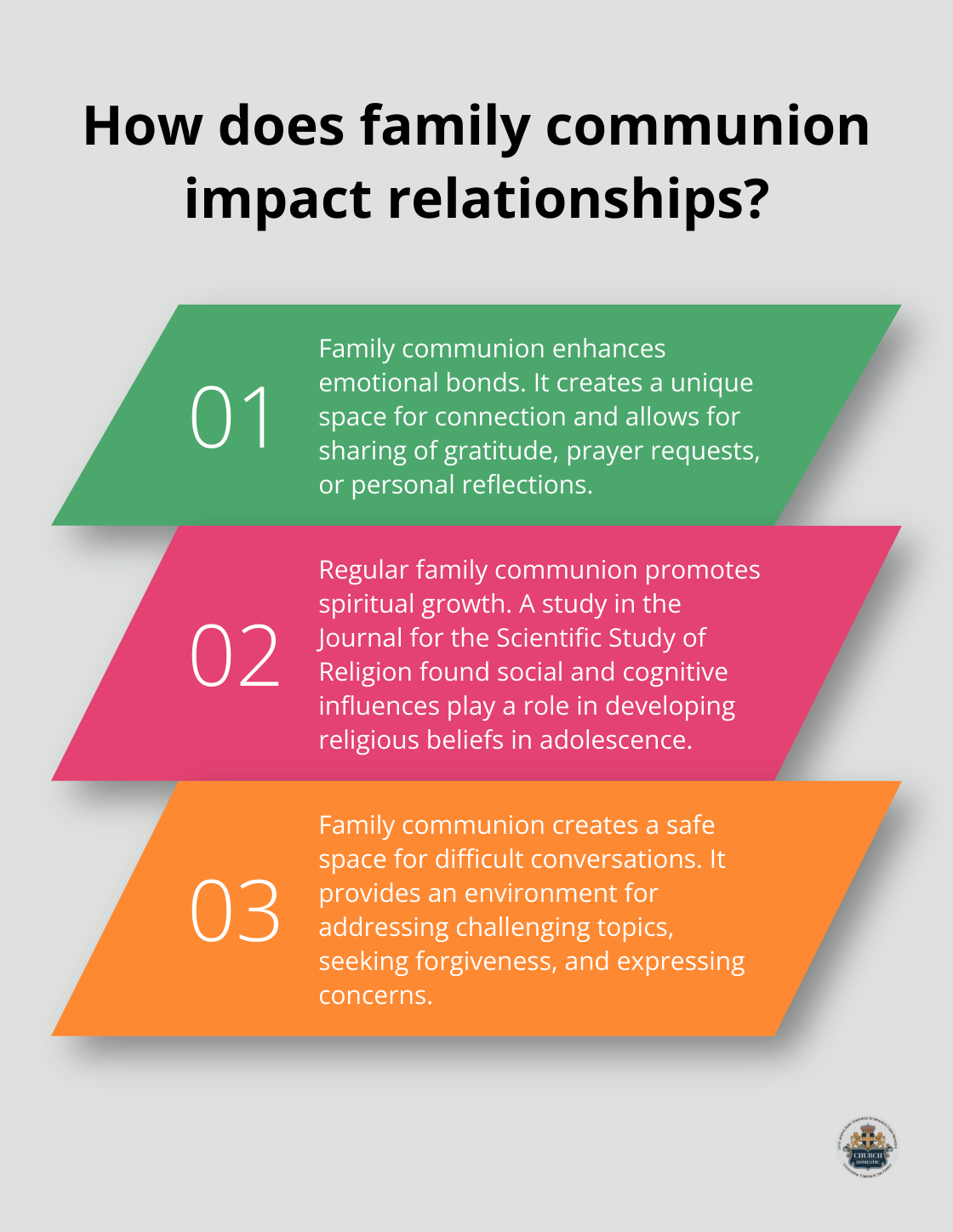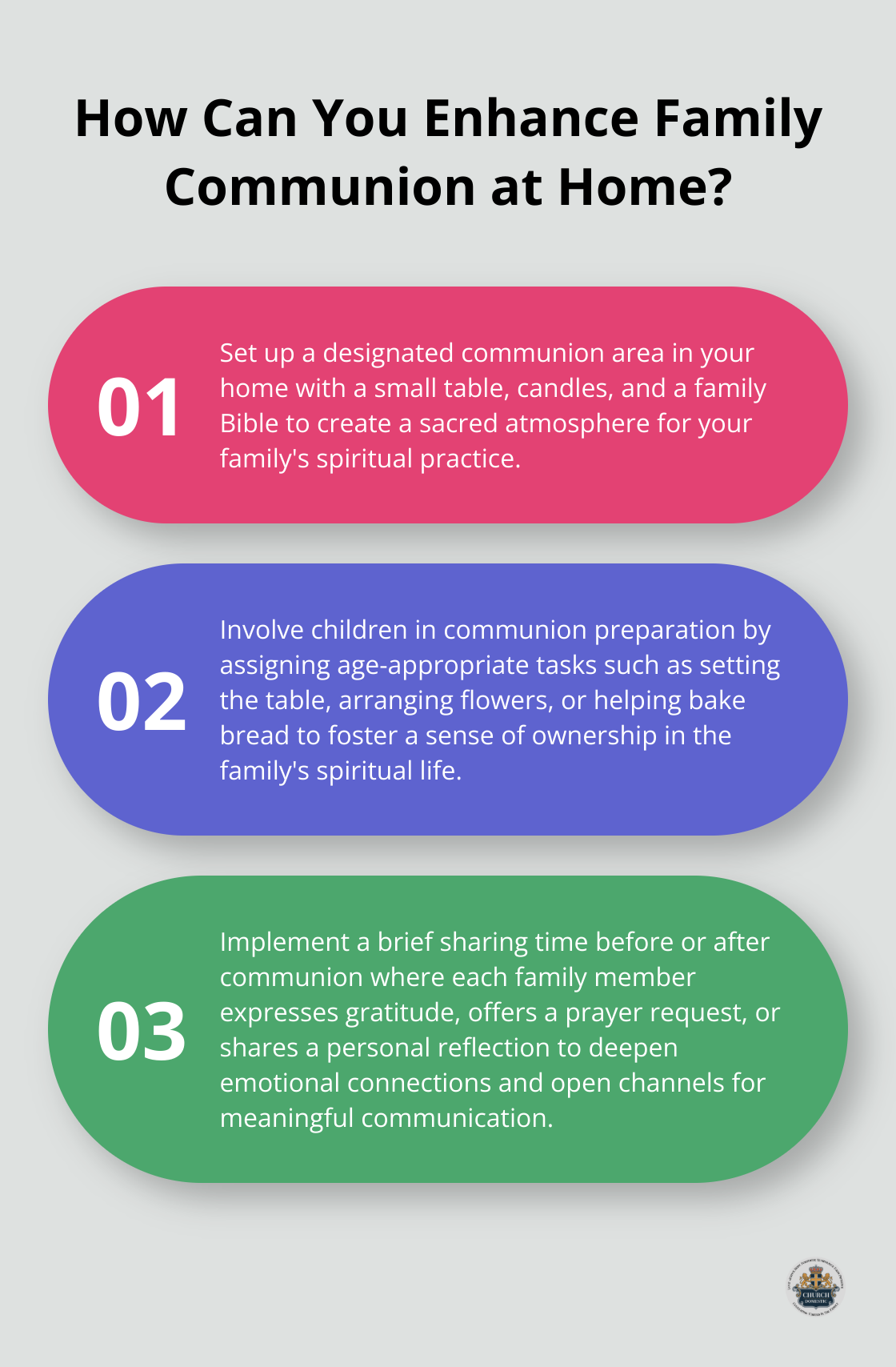At Church Domestic, we believe that family communion can be a powerful tool for strengthening bonds within the home.
This sacred practice, rooted in biblical tradition, offers families a unique opportunity to connect spiritually and emotionally.
In this post, we’ll explore why sharing communion at home can deepen your family’s faith and unity, and provide practical tips for making it a meaningful part of your spiritual life.
Why Early Christians Practiced Communion at Home
The practice of sharing communion at home has deep roots in Christian history. Early believers often gathered in private dwellings to worship, break bread, and remember Jesus’ sacrifice. This tradition, far from a modern innovation, formed a cornerstone of early Christian life.
The New Testament House Churches
The book of Acts provides numerous examples of believers meeting in homes. Acts 2:46 states that they “broke bread in their homes and ate together with glad and sincere hearts.” These gatherings transcended mere social events; they represented sacred moments of worship and communion.
Breaking Bread: A Sacred Act
The phrase “breaking bread” in the New Testament often refers to the practice of communion. When Paul visited Troas (Acts 20:7-11), he joined believers who had come together to “break bread.” This act signified more than a simple dinner; it embodied a sacred act of remembrance and worship.
Home Communion in Early Christian Communities
Early Christian communities lacked dedicated church buildings. Instead, they met in homes, often in secret due to persecution. These house churches served as the primary locations for worship, teaching, and communion. The intimacy of these settings fostered deep connections and meaningful spiritual experiences.
The Power of Home-Based Worship
The revival of home communion practices can bring similar depth and intimacy to modern family life. Participation in religious services is associated with numerous aspects of human flourishing, including happiness and life satisfaction, mental and physical health. Sharing this sacred meal in our homes connects us not only with each other but with a tradition that spans millennia. It’s inspiring to follow in the footsteps of those early believers, whose example demonstrates the home’s potential as a powerful place of worship and spiritual growth.
Transitioning to Modern Home Communion
As we move forward to explore the preparation and benefits of family communion, we must consider how to adapt these ancient practices to our contemporary lives. The next section will guide you through the practical aspects of preparing for communion at home, ensuring that this meaningful tradition continues to strengthen family bonds in the present day.

How to Prepare for Home Communion
Preparing for home communion transforms into a meaningful activity that involves the whole family. This process brings families closer together and deepens their spiritual connection. Here’s how you can make it a special experience for everyone.
Involving Children in the Preparation
Children play a significant role in preparing for home communion. Assign age-appropriate tasks to make them feel included. Younger kids can help set the table or arrange flowers, while older ones might assist in baking bread or pouring juice. This involvement helps children understand the importance of the sacrament and creates a sense of ownership in the family’s spiritual life.
Studies have shown that parental religiousness can have effects on parenting and child development, although most research focuses on specific religious or cultural groups. When you involve kids in communion preparation, you not only create a memorable experience but also potentially influence their future spiritual journey.
Choosing the Right Elements
The selection of appropriate elements for home communion matters. While traditional communion uses bread and wine, many families opt for alternatives. Grape juice serves as a common substitute for wine, especially in households with children or those who avoid alcohol. For bread, you can use unleavened bread, regular bread, or even crackers.

Some families choose to bake their own communion bread as part of the preparation process. This activity becomes a wonderful bonding experience and allows you to customize the bread to dietary needs or preferences. If you decide to bake, try using a simple recipe with just a few ingredients to keep the focus on the spiritual significance rather than culinary complexity.
Creating a Sacred Space
The designation of a special area in your home for communion enhances the experience. This doesn’t need to be elaborate – a clean, uncluttered space with a small table or altar will suffice. You might add elements like candles, a cross, or a family Bible to create a reverent atmosphere.
Consider the timing of your communion as well. Many families find that evening (after dinner) works well. This allows everyone to be present and creates a natural transition from the day’s activities to a time of spiritual reflection.
The goal becomes to create an environment that feels sacred and special to your family. It doesn’t have to be perfect or match what you might see in a church setting. The most important aspect is that it feels meaningful to you and your loved ones.
Prayerful planning can enhance the experience by integrating specific prayers or prayer stations focusing on various aspects of communion, such as thanksgiving, confession, and supplication.
The thoughtful preparation for home communion creates a powerful tradition that can strengthen your family’s faith and bonds. This practice allows you to bring the sacred into your everyday life, making your home a true domestic church. As we move forward, let’s explore the spiritual and emotional benefits that family communion can bring to your household.
How Family Communion Impacts Relationships
Family communion transcends a mere religious ritual; it serves as a potent instrument for relationship strengthening and spiritual growth within the home. This practice has the power to transform family dynamics and deepen faith connections.
Emotional Bond Enhancement
When families share communion, they create a unique space for emotional connection. This sacred moment allows family members to set aside daily distractions and focus on their shared faith and values. Family prayer serves important functions and influences relationships in various ways, including as a time of family togetherness and interaction.

One practical way to enhance this connection involves a brief sharing time before or after communion. Each family member can express gratitude, offer a prayer request, or share a personal reflection. This practice not only deepens the communion experience but also opens channels for meaningful communication.
Spiritual Growth Promotion
Regular family communion can significantly impact individual and collective spiritual development. A study published in the Journal for the Scientific Study of Religion found that social and cognitive influences play a role in the development of religious beliefs and commitments in adolescence.
To maximize spiritual growth, families can implement a devotional or Bible reading alongside their communion practice. They can choose passages that relate to the elements of communion, such as Jesus’ teachings on love, sacrifice, or community. This approach helps family members connect the symbolic act of communion with practical faith applications in daily life.
Safe Space Creation for Difficult Conversations
The intimate setting of family communion can provide a safe environment for addressing challenging topics. The shared spiritual experience can soften hearts and open minds, making it easier to discuss sensitive issues or resolve conflicts.
After communion, families might set aside time for members to seek forgiveness or express concerns. This practice (grounded in the spirit of reconciliation embodied by communion) can lead to healing and stronger family bonds.
Tradition Establishment
Family communion helps establish meaningful traditions that can be passed down through generations. These traditions (when consistently practiced) create a sense of continuity and stability within the family unit. They also provide a framework for teaching children about faith, values, and the importance of family unity.
Stress Reduction and Well-being Promotion
The act of coming together for communion can serve as a stress-reducing ritual for families. It provides a regular time of peace and reflection amidst busy schedules. Studies have shown that religious practices can contribute to overall well-being and mental health (particularly when shared as a family unit).
Final Thoughts
Family communion transforms households when integrated into spiritual life. Set a consistent schedule, prepare elements and space in advance, and create a simple liturgy that fits your family’s style. Address concerns openly, emphasize connection over judgment, and allow each person to engage at their own pace.

Church Domestic encourages you to start this journey of family communion. It deepens faith, strengthens relationships, and creates lasting memories (nurturing a domestic church that withstands challenges). You don’t need perfection; focus on creating a meaningful experience that brings your family closer together and closer to God.
For more resources on family life, business, and enjoying life with good friends, visit us at Church Domestic. We support you in creating a thriving family life grounded in faith and love.